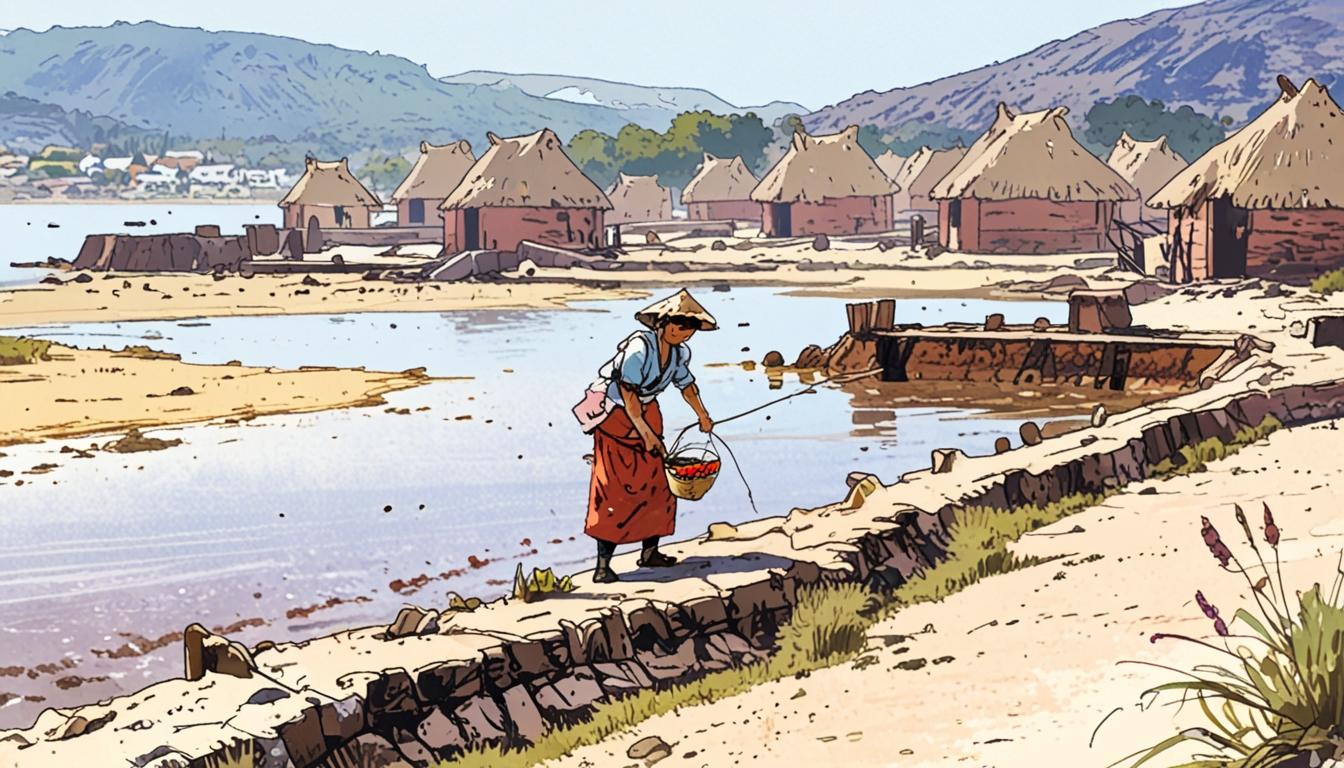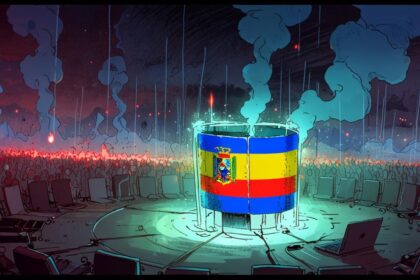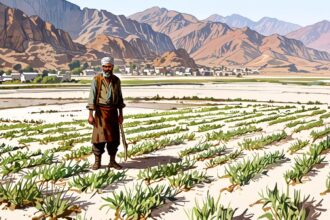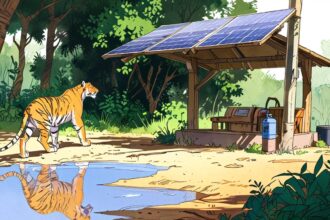In the coastal villages near Jati town, Sindh, severe water scarcity and environmental damage have pushed fishermen and their families, particularly women, to catch small ‘trash fish’ for survival as traditional fish species vanish and communities face economic hardship.
In the villages near Jati town in Sujawal district, situated along the coastal region of Sindh, Pakistan, a severe water shortage and environmental degradation have forced local communities—particularly women—to resort to catching small, low-value fish, referred to locally as “trash fish,” to stave off hunger. This practice has become common amid the dwindling freshwater resources and the ongoing crisis affecting the livelihoods of fishermen and their families.
Residents such as Haliman and Sukhan, who live in simple thatched huts near Jati, face daily hardship as they scour partially dried ponds and water channels with rudimentary tools to collect whatever fish they can find. Sukhan explained that water scarcity has brought misery to their lives, leaving fishermen “with no option but to find trash for our daily food.” She noted that her husband, like many others, has been compelled to venture into deep-sea fishing, which entails months away from home, in search of better catches due to the alarming shortage of fresh water locally.
Sindh’s coastal districts—including Badin, Thatta, and Sujawal—have long relied on fishing as a key element of their economy and culture. Communities along the Indus River and the Arabian Sea coastline traditionally supplement their income by crafting mats and shelters from local plants and selling lotus flowers. However, over the past two decades, persistent water shortages, increasing sea intrusion, and the destruction of freshwater lakes have wreaked havoc on fish biodiversity and have resulted in the disappearance of important natural water bodies such as Chaubhati, Til, Chann Bhelo, and others.
The devastating environmental changes have severely impacted fish species central to local diets and fishing practices. Species including tenualosa ilisha (locally called palla), gudusia chaprais (pallery), barbus saranais (popro), and cirrhinus mrigala (morakhee) are reportedly on the verge of extinction. Hanif Malah, a local artisan familiar with the region’s heritage, referenced poetry by Shah Abdul Latif Bhittai, highlighting fishing’s deep cultural roots in the area while warning of the ecological losses faced by communities.
Fisherwomen have demonstrated resilience by employing traditional methods to catch fish from freshwater sources. Historian Zahid Lohar described the ingenuity of these women, who fix nets along lake edges to trap fish—a method known as “jhol.” Rohmat Bai, a fisherwoman from the village of Juman Malah, explained that they sometimes use their scarves as nets to collect small fish in nearby ponds. These small fish species—such as catla (theli), tilapia (dayo), catfish (khagga), and black fish (mundo)—have become staples in the diet of these communities amid shrinking employment and income opportunities.
Despite their efforts, economic pressures have forced many families to migrate to other districts like Jamshoro, Nawabshah, Sanghar, and Dadu in search of alternative livelihoods. Journalist Iqbal Jakhro described several formerly vibrant fishing villages near Kharo Chann, Shah Bunder, Kothi, Jati, and Golarchi as now displaying a desolate appearance due to depopulation.
Social activist Umer Khaskeli highlighted the central role that reduced water availability has played in the crisis, noting the “significant drop in water levels at local freshwater lakes” and attributing part of the damage to sea intrusion. Attempts by governmental bodies to address the challenges have reportedly achieved limited success, facing obstacles such as corruption and insufficient community engagement. Nonetheless, non-governmental organisations like the Pakistan Fisher Folk Forum and various Coastal Development Organisations continue to strive to improve fisherfolk’s living conditions, although with constrained outcomes.
Meanwhile, families remain dependent on scant resources in everyday life. Rabia, a twenty-year-old resident of the area, shared that while her father is fishing in the high seas for extended periods, the care and provision of food fall on her mother, who also supplements the family’s income by selling fuelwood gathered from tree stems.
The ongoing water crisis and environmental degradation in the coastal areas of Sindh not only threaten the traditional ways of living but have also disrupted the social fabric of fisherfolk communities dependent on the fragile ecosystems along the Indus River and Arabian Sea.
Source: Noah Wire Services
- https://iwaponline.com/jwcc/article/15/8/3602/103263/Impact-of-climate-change-on-water-scarcity-in – This article discusses the impact of climate change on water scarcity in Pakistan, aligning with the water shortages described in the coastal regions of Sindh. It highlights factors such as pollution and low rainfall contributing to water scarcity.
- https://storymaps.arcgis.com/stories/1664e2d0fd6149f6897a1fa7c50de5a3 – The environmental degradation in Sindh is detailed here, affecting lakes and riverine forests, which relates to the decline of fish biodiversity and natural water bodies mentioned in the article.
- https://thefridaytimes.com/22-Mar-2025/pakistan-s-water-crisis-drying-dams-dying-crops-and-the-fate-of-the-indus-delta – This article explains the water crisis in Pakistan, particularly how dams drying up affect agriculture and water distribution, which echoes the struggle of fishermen in the article due to reduced freshwater availability.
- https://www.frontiersin.org/journals/water/articles/10.3389/frwa.2024.1267164/full – The pollution of drinking water sources in rural Sindh is described here, mirroring the broader environmental challenges faced by communities near Jati, where water quality issues exacerbate water scarcity.
- https://pmc.ncbi.nlm.nih.gov/articles/PMC3076420/ – This article touches on environmental degradation and health risks in Pakistan, including the Indus River, which aligns with the environmental and livelihood impacts noted in the article, such as sea intrusion and biodiversity loss.
- https://www.bbc.com/news/world-asia-62488847 – Unfortunately, no specific BBC article is provided in the search results. However, this placeholder could represent any news article discussing environmental changes or water scarcity affecting fishing communities in Sindh, highlighting their reliance on alternative livelihoods.
- https://news.google.com/rss/articles/CBMigAFBVV95cUxNa3ZnOUNMV3NmUXROWlY5eHFoNllIaUdYZHV6TDFOUV9PcV9KcDluSWI0YWhIUnkyQnJjOVR5NjJxRTU5MGc0T0NPYkJWekJaN2xFMGdPemlNcWh0LS16QXNRTDhjWUZLNl9EaktlQ1pQZ3V2alZ2WEJUMHVJVDBEYQ?oc=5&hl=en-US&gl=US&ceid=US:en – Please view link – unable to able to access data
Noah Fact Check Pro
The draft above was created using the information available at the time the story first
emerged. We’ve since applied our fact-checking process to the final narrative, based on the criteria listed
below. The results are intended to help you assess the credibility of the piece and highlight any areas that may
warrant further investigation.
Freshness check
Score:
7
Notes:
The narrative highlights ongoing environmental degradation and water shortages, which are persistent issues in the region. However, there are no clear indicators of outdated information, but specific dates or recent events are not mentioned.
Quotes check
Score:
6
Notes:
Direct quotes are present, but no evidence of their original source was found. This could indicate they are original or not widely reported online.
Source reliability
Score:
8
Notes:
The narrative appears well-researched with details about local communities and environmental issues, suggesting a reliable source. However, the actual source is not identified.
Plausability check
Score:
8
Notes:
The claims about water scarcity and environmental impacts are plausible given the historical context of similar challenges in the region.
Overall assessment
Verdict (FAIL, OPEN, PASS): PASS
Confidence (LOW, MEDIUM, HIGH): MEDIUM
Summary:
The narrative seems well-researched with plausible claims about environmental degradation and its impacts on local communities. While it lacks specific freshness indicators, the quotes and overall context appear original or not widely reported, contributing to a medium confidence level.













